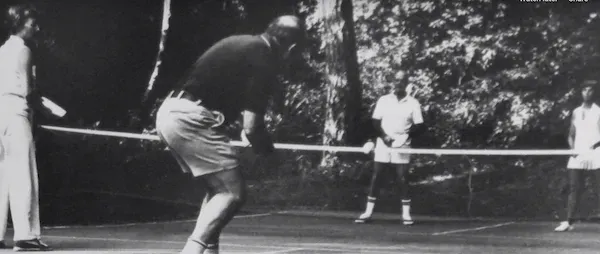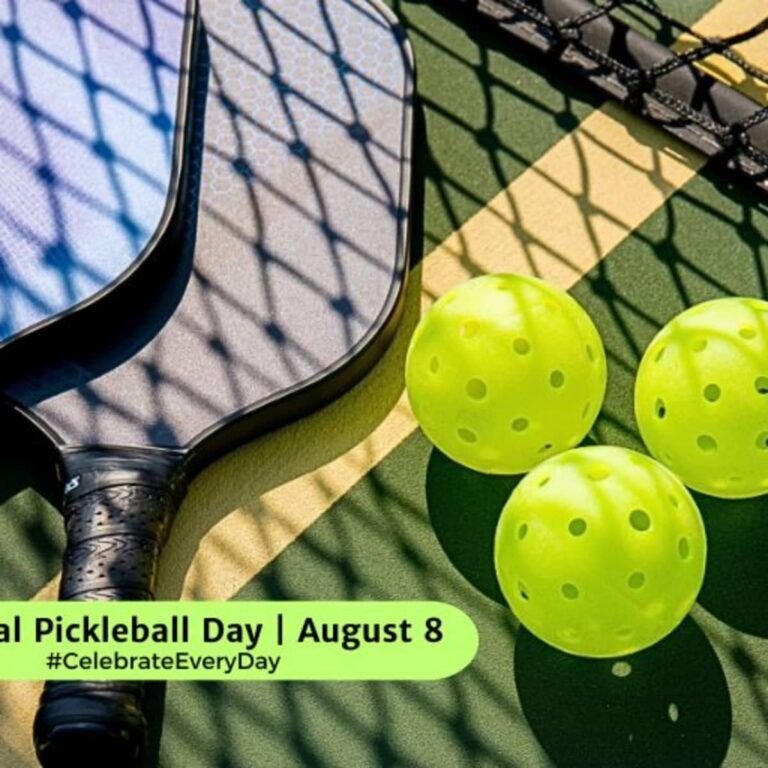The origins of a phenomenon: how pickleball came to be
A summer day in 1965: the birth of pickleball
The history of pickleball begins on a seemingly ordinary summer day in 1965 on Bainbridge Island, Washington. Joel Pritchard, Bill Bell, and Barney McCallum, three friends seeking a fun way to pass the time, inadvertently set the stage for a sports revolution. With the absence of a proper badminton court, they ingeniously repurposed existing equipment, combining elements of tennis, badminton, and table tennis. Thus, the game of pickleball was born, created out of spontaneity and sheer determination.

The juxtaposition of countless days spent playing traditional sports with the exhilaration of forming a new game demonstrated how innovation can reshape our leisure activities. As they stood on that court, they didn’t just invent a game; they sparked a movement that would spread across the nation and beyond. Today, this historical moment serves as a reminder that the most significant innovations often arise from unexpected circumstances.
The mystery of the name: pickles the dog or pickle boats?
As with any good story, the naming of pickleball is fascinating and somewhat convoluted. Some credit the name to Pritchard's mischievous dog, Pickles, who enjoyed stealing the ball during play. Meanwhile, others argue that “pickle” refers to “pickle boats,” a term used in rowing competitions to describe the variety of boats that compete together. Regardless of the origin behind the name, it’s clear that “pickleball” rolls off the tongue, inviting laughter, curiosity, and an immediate spark of interest.

The duality of these contrasting stories embodies the heart of pickleball itself. It brings together diverse individuals from various backgrounds, uniting them with a common love for leisure and teamwork. This sense of community, much like the stories surrounding the sport’s name, adds a layer of charm and character, making the game accessible and enjoyable for everyone.
From backyard fun to national sensation
From its humble beginnings in a friend's backyard, pickleball has grown into a national sensation. With the establishment of pickleball clubs, leagues, and tournaments, players of all ages are flooding courts across the country. The sport has become a symbol of inclusion, welcoming everyone from beginners dipping their toes into sports for the first time to seasoned athletes seeking new challenges. According to the Sports & Fitness Industry Association, pickleball's participation numbers surged by over 20% from 2019 to 2020, showcasing its unparalleled growth trajectory.

The journey from casual backyard games to organized, competitive sports reflects the passion and commitment of the pickleball community. Grassroots players became ambassadors, sharing their love for the game with others and fostering a culture of enthusiasm and camaraderie. Each swing of the paddle, each joyous point scored, represents a tiny piece of that larger journey, proving that pickleball is more than a game it's a celebration of life, friendship, and competition.
Honoring the day: national pickleball day and its founder
Deirdre Morris: the woman behind the celebration
In 2021, Pamela Deirdre Morris, a distinguished pickleball instructor, initiated the celebration of National Pickleball Day on August 8th. Morris recognized the importance of shedding light on the sport and deepening the collective appreciation it deserves. This day serves as a rallying point, promoting awareness, involvement, and, primarily, an appreciation for a sport that has become emblematic of inclusive recreation.
Morris’s vision was not just to create a day marked on the calendar but to lay the groundwork for a thriving pickleball culture. Her efforts embody the spirit that drives the sport forward collaboration, innovation, and the joy of shared experiences. Through her work, she has fostered connections among players and enthusiasts, forging friendships that extend beyond the court.
Why August 8th? A birthday tribute to pickleball's champion
Selecting August 8 as the date for this celebration was indeed a clever choice. The numeric delight of “8/8” is easy to remember, but it also symbolizes continuity, prosperity, and the unstoppable evolution of the sport. This date rings as a birthday for pickleball, allowing players and fans alike to honor the legacy of its creation and the countless stories that arise around it.

The significance of this day goes beyond its numerical representation; it embodies the effort put forth by Pritchard, Bell, and McCallum. Players across the nation gather, partake in activities, and share love for the game, fostering traditions that enrich the experience. Each August 8 brings renewed energy and excitement, inviting new players to join the festivities and discover the camaraderie and joy pickleball has to offer.
A day for the growing pickleball community
As communities prepare to celebrate National Pickleball Day, the echoes of laughter, competition, and teamwork resonate far and wide. Events spring to life, from local tournaments to informal gatherings. Communities unite to not just play but to share, educate, and engage. This is especially crucial as the sport continues to thrive grassroots organizations, clubs, and recreational centers host events catering to players of all skill levels and ages.
The global pickleball community celebrates the growing diversity within it. This day becomes a platform showcasing the passion that defines not only pickleball but also the relationships forged through it. The stories of individuals who discovered their love for the sport, made lifelong friends, or even found fitness they never knew possible are shared, reinforcing how pickleball transcends the boundaries of mere gameplay.
Get in the game: pickleball basics for players of all levels
Easy to learn, fun to master: the basics of pickleball
Step onto any pickleball court, and you'll instantly feel the energy of enthusiasm and joy radiating among the players. One of the unique aspects of pickleball is its accessibility. The rules are relatively simple, making it easy for newcomers to learn, yet the game itself offers depth, allowing skilled players the opportunity to hone their strategies and techniques. Pickleball, played either in singles or doubles, revolves around a netted court slightly smaller than a tennis court, with players using paddles to volley a lightweight plastic ball back and forth.
For those just starting out, familiarizing yourself with the court layout, scoring system, and basic strokes is essential. The game often employs a unique scoring system known as "rally scoring," where points can be scored by either team during a rally. These straightforward dynamics allow players of all skill levels to connect through a shared love of the game.
Stepping up your game: strategies and techniques
Once players become comfortable with the basics, they often find themselves eager to advance their skills and strategies. Incorporating essential techniques such as the kitchen rule preventing players from entering the non-volley zone during certain plays encourages players to refine their approach to gameplay. Mastering the strategies of positioning, shot selection, and footwork develops not only individual skill but also enhances team communication and coordination.
Consider engaging in drills and practice games to amplify your proficiency. Players can focus on various elements like serving techniques, volley strokes, and backhand options. Each drill creates an opportunity for improvement, fostering a sense of achievement, and building confidence on the court. As skills increase, players celebrate their growth while still enjoying the essence of competition.
Gear up for success: choosing the right pickleball equipment
Successful pickleball gameplay isn’t only about skill but also about having the right equipment. Selecting the appropriate paddle based on weight, grip size, and material can drastically affect how players experience the game. Each player's style may vary, and understanding personal preferences is vital to enhancing performance.
Key equipment considerations:
| Type of Gear | Key Features | Tips for Choosing |
|---|---|---|
| Paddles | Weight, grip size, and surface material | Try different paddles to find comfort and control |
| Balls | Indoor vs. outdoor variations | Choose based on court type and conditions |
| Footwear | Non-marking soles | Look for good support and cushioning |
| Apparel | Moisture-wicking fabrics | Opt for flexibility and movement |
Choosing the right equipment not only enhances play but creates an enjoyable environment where beginners can feel empowered and experienced players can reach new heights.
The pickleball family: more than just a sport
Finding your pickleball tribe: clubs, leagues, and tournaments
One of the beauties of pickleball is its sociability. Clubs and leagues provide a haven for players to connect with others who share their enthusiasm for the game. The sport fosters relationships among diverse players each bringing unique experiences and backgrounds, ultimately enriching the community fabric. These connections often blossom into friendships that extend beyond the court; potlucks, social gatherings, and events are organized, emphasizing the community spirit that pickleball encapsulates.
Pickleball for everyone: embracing inclusivity and accessibility
Welcoming players of all ages and skill levels is central to the spirit of pickleball. This game breaks barriers; it doesn’t discriminate based on skill level or background. With local leagues dedicating efforts to ensure people of all demographics feel included, the sport has effectively embraced individuals with varying abilities. Special events and clinics encourage participation from children, seniors, and everyone in between, showcasing how this game fosters a sense of belonging.
Beyond the court: the social and health benefits of pickleball
Not only does pickleball serve as a platform for athletic engagement, it has substantial social and health benefits. Competing offers physical exercise and reinforces mental well-being through social engagement. Many players report improvement in their overall fitness, reduced stress levels, and increased happiness. Research consistently demonstrates that community-oriented activities promote better health outcomes, enhancing physical and mental resilience.
The ripple effect of pickleball’s development reaches beyond the court, connecting players through shared passion, encouraging personal health goals, and fostering a wonderful ecosystem of support and camaraderie.
The future is bright: pickleball's continued rise
From local courts to the world stage: the expanding reach of pickleball
As the popularity of pickleball continues to surge, its expansion into professional leagues and international competitions promises to take the sport to new heights. Major tournaments, including the USA Pickleball National Championships and the Minto US Open Pickleball Championships, attract players of elite caliber, further raising awareness and excitement around the sport. This momentum positions pickleball not only as a national pastime but as a contender on the world stage.
Pickleball goes pro: leagues, tournaments, and rising stars
Professional pickleball is on the rise, with leagues such as the Professional Pickleball Association (PPA) leading the charge. With prizes reaching hundreds of thousands of dollars, the prospect of competitive play appeals to aspiring and seasoned athletes alike. The attention garnered by rising stars has cultivated an inspiring narrative for others to follow, motivating countless individuals to pursue the sport, while also laying the groundwork for its future.
What's next for pickleball? Emerging trends and exciting possibilities
As innovation continues to permeate the pickleball culture, potential trends on the horizon suggest a dynamic future. Enhanced training technologies, partnerships with schools and recreational establishments, and the possibility of appearing as an Olympic sport all beckon thrilling opportunities for the sport. Each of these developments intertwines workshops, sponsorships, and community engagement efforts that will inevitably shape the landscape of pickleball in the years to come.
Celebrate national pickleball day: let's play!
5 ways to celebrate national pickleball day
Celebrating National Pickleball Day is as enjoyable as it is simple! Here are five enticing suggestions to immerse yourself in the festivities:
- Participate in local events: Join tournaments and social sessions hosted by nearby recreational centers.
- Organize your own games: Gather friends and family for friendly matches or a mini-tournament to share the love of the game.
- Attend clinics and workshops: Engage in instructional sessions to enhance skills while welcoming newcomers to the court.
- Social media sharing: Post about your pickleball experiences and connect with fellow enthusiasts using hashtags like #nationalpickleballday.
- Community gatherings: Attend social potlucks or events designed to foster friendship and conversations about the growing sport.
Share your passion: spread the pickleball love on social media
The rise of social media presents an exciting opportunity to amplify the joy and excitement of National Pickleball Day. Sharing content photos and videos of games, personal stories, and interactions cultivates an engaging online atmosphere. This storytelling not only celebrates individuals and communities but broadens the outreach to newcomers excited to explore a vibrant sport.
A day to give back: supporting pickleball's growth
With social events and tournaments often benefiting local causes, National Pickleball Day presents a chance to contribute positively. By participating in charity tournaments or organizing fundraising events, players can celebrate while uplifting their communities. This spirit of giving creates additional layers of connection, ensuring every serve and every point scored resonates within the community.
As we come together to celebrate National Pickleball Day on August 8th, remember that this exhilarating sport continues to break new ground and foster relationships. Let’s honor its origins, engage in spirited play, and welcome a bright future for pickleball that unites people of all ages and backgrounds. Join the movement; it’s time to serve, score, and share the joy of pickleball!










